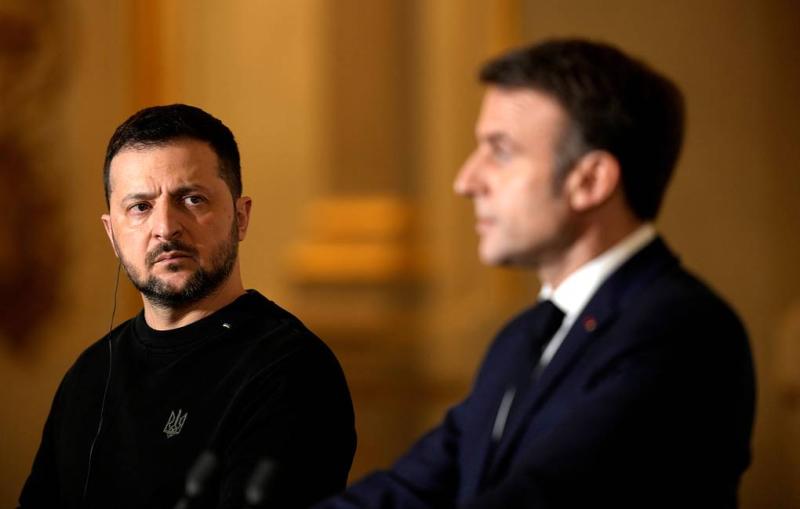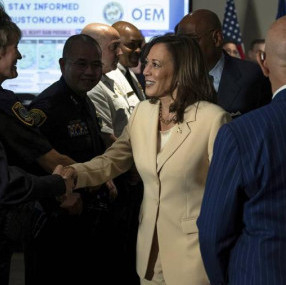
- Press review: US lets Kiev use anti-personnel mines and Iran may halt uranium enrichment
- Press review: Uranium costs soar as Moscow updates nuclear doctrine and US OKs attacks
- Press review: Russian air defenses can down Western missiles as EU conducts live exercise
- G20 leaders adopt Rio de Janeiro Summit Declaration
Ukrainian President Vladimir Zelensky plans to capitalize on French President Emmanuel Macron's visit to Kiev; Armenian Prime Minister Nikol Pashinyan has set conditions for Yerevan’s continued membership in the CSTO; and Kiev and Tbilisi are at loggerheads as they exchange mutual ultimatums over Russia. These stories topped Wednesday’s newspaper headlines across Russia, according to TASS News Agency.
Nezavisimaya Gazeta: Zelensky prepares to get maximum benefit from Macron’s visit to Kiev
During French President Emmanuel Macron’s visit to Ukraine, he and Ukrainian counterpart Vladimir Zelensky are expected to discuss the options for organizing military training of Ukrainian armed forces personnel, as well as joint production at facilities in Ukraine’s military-industrial complex, Zelensky said. This, according to him, could entail the deployment of French military and technical experts to Ukraine. At the same time, experts told Nezavisimaya Gazeta, despite Macron's requests, Paris is unlikely to send regular military units to assist Kiev.
Ukraine does not need to involve the French army in hostilities, but it may be interested in having instructors from France training Ukrainian soldiers on its own soil, Zelensky said in an interview with Le Monde. In addition, the presidents plan to discuss cooperation in the area of weapons production. As a result, Zelensky suggested that consideration be given to sending technical personnel to Ukraine.
Earlier, the Western allies reacted strongly to Macron's bombshell proposal to dispatch armed contingents to support Ukraine, with various party leaders in France calling him irresponsible, despite their well-known current willingness to demonize Russia and cheerlead for Ukraine, Sergey Fedorov, leading researcher at the Russian Academy of Sciences’ Institute of Europe, told Nezavisimaya Gazeta.
At the same time, Macron is also being driven to take a more active posture by fears of losing this summer’s elections to the European Parliament. However, given the circumstances, Paris will probably prove reluctant to send its own armed units to help Kiev, and would most likely limit itself to dispatching only military experts and technical teams, the newspaper writes.
Zelensky's need to confirm the legitimacy of his presidency, with the end of his five-term term looming in May but the late-March presidential election canceled due to martial law, may further complicate matters. "Why should Macron have to confirm the legitimacy of the Ukrainian president, when this is something that the Ukrainian people should do? This situation only confirms that Ukraine is under external control," Fedorov added. He believes that if this issue arises, the French president will try to avoid interfering directly in internal Ukrainian affairs and will likely try to duck answering any direct questions. However, he could once again affirm his support for Zelensky in the current conflict with Russia, the expert added.
Vedomosti: Pentagon may lack sufficient funds to replenish own weapons stocks
The US Department of Defense (DOD) needs $10 bln to replenish its stocks of weapons and military equipment, according to Politico. The authoritative Washington publication reports that the DOD's current funds are insufficient and that a significant part of the required amount will be available only if a consolidated national security appropriations package gets through Congress, which would include support for Ukraine and Israel, as well as US allies in the Asia-Pacific region. At the same time, experts told Vedomosti, the US armed forces currently have enough weapons on hand and could conduct several military campaigns simultaneously.
The lack of funds for upgrading US military stockpiles may further limit the Pentagon's ability to help Ukraine. A source told Politico that the DOD has available funding for this purpose ($4.4 bln) that was appropriated as part of previous packages, but it is not being used due to a lack of funds for replenishing stockpiles.
According to Igor Shkrobtak, senior researcher at the Russian Academy of Sciences’ Institute for US and Canadian Studies, the lack of funds for replenishing weapons stocks has not yet damaged the US armed forces. However, it has "not the best effect" on the readiness of both American allies and the US itself, because it affects their ability to produce weapons and ammunition independently. "There is not yet enough production capacity to fully renew the reserves," Shkrobtak said.
The issue of replenishing supplies is also political as it is critical to persuade members of Congress, especially among the thin Republican majority in the House of Representatives, to approve another aid package for Ukraine as soon as possible, Sergey Sudakov, corresponding member of the Academy of Military Sciences, told Vedomosti.
The expert emphasized that, according to all estimates, the United States does not have any problems with weapons at the moment and could conduct military campaigns in several theaters at once. The expert clarified that one such theater of military operations could be Taiwan as part of a potential escalation of the US-China competition in the region. This, in turn, is the long-term goal of the US military-industrial complex. The current stage of increased military production is focused on a long-term confrontation with China and the strengthening of US strategic capabilities in the Asia-Pacific region.
Vedomosti: Pashinyan names conditions for Armenia’s CSTO membership
Armenia will leave the Collective Security Treaty Organization (CSTO) if it does not answer Yerevan's questions about the organization's jurisdiction, Prime Minister Nikol Pashinyan said at a press conference on March 12. Pashinyan said that Yerevan has suspended its participation in the CSTO and has no representation there. He also announced the withdrawal of Russian border guards from Yerevan’s Zvartnots International Airport, where they have been stationed since 1992, effective August 1. According to the prime minister, conflicts between Armenia and the CSTO will be resolved if the organization's responses meet Yerevan's expectations, Vedomosti writes.
According to Armenian political scientist Johnny Melikian, the decision to withdraw the Russian border guards stems from a crisis in Russian-Armenian relations following the catastrophic consequences of the second Karabakh War and the ethnic cleansing of Armenians in Nagorno-Karabakh, which Yerevan had hoped to avoid by enlisting Moscow's help.
Vadim Mukhanov, head of the Caucasus branch of the Center for Post-Soviet Studies at the Russian Academy of Sciences’ Institute of World Economy and International Relations (IMEMO RAS), told Vedomosti that Yerevan has apparently decided to shift its foreign policy priorities. The diversification and expansion of Armenia’s contacts (especially military-technical cooperation with France and India) will certainly "erode" its strategic relations with Russia, he believes.
In this regard, in order to understand the aspirations of the Armenian leadership, it is necessary to build on the statements of Pashinyan, who believes that Yerevan's strategic mistake has been to rely on total dependence on Russia in security matters, the expert said. "Now Armenia is taking concrete steps to reduce this dependence; without waiting for the desired reaction from the CSTO, the question of membership is being raised," he said.
According to Mukhanov, the Russian border guards and the 102nd Russian military base in Gyumri are symbols of the Russian-Armenian union. The Armenian authorities, who are calling for the withdrawal of border guards from all parts of the country, are thus undermining allied relations, the expert believes. "A fundamental change in bilateral relations will come if Yerevan officially raises the question of the advisability of having any Russian border guards at all and then [whether Armenia should host] the base," he said.
Kommersant: Repairs to Nord Stream pipeline could cost 1.3 bln euros
The cost of rebuilding the Nord Stream gas pipeline, which was destroyed by explosions in 2022, could reach 1.2-1.35 bln euros, according to a preliminary estimate by project operator Nord Stream AG of the cost of work required for removing water from the pipes, stabilizing them, repairing them and refilling the lost gas reserves. The company is preparing to file a lawsuit against the Western insurers of the project, who are refusing to pay. Analysts told Kommersant that they believe that restoring the pipes after such an assessment of the work would be prudent given long-term demand for gas and high gas prices.
In February, Nord Stream filed a 400-mln-euro lawsuit in a British court against insurance companies, demanding that they cover the damage caused to the gas pipeline by the still unsolved explosions in September 2022. The defendants are Lloyd's of London and Arch Insurance, which have refused to cover the damage.
The lawsuit against Lloyd's of London relates to the provision of primary insurance policies, which require insurers to pay for the initial damage resulting from an event. According to the Financial Times (FT), Arch Insurance was supposed to provide so-called excess cover, which kicks in after the underlying policies have been paid out.
Maria Belova of Implement told Kommersant that restoration would be possible only if there was a consistent long-term demand for this gas at a premium price.
However, according to Sergey Kondratyev of the Institute of Energy and Finance, restoration may be viable even at current gas prices. Now that the EBITDA for gas supplies via Nord Stream exceeds $100 per 1,000 cubic meters, the relaunch of Nord Stream would allow for payback within a few months. However, this calculation assumes that the pipeline is fully loaded. At the same time, Kondratyev believes that the chances of resuming work on the gas pipeline in the coming quarters are low due to significant political risks.
Izvestia: Kiev, Tbilisi exchange ultimatums concerning Russia
Ukrainian-Georgian relations began to deteriorate in early March when Tbilisi demanded that Kiev extradite fugitive official Zurab Adeishvili. David Arakhamia, a representative of Ukraine's ruling Servant of the People party, responded with three counter-demands to restore relations. According to him, Tbilisi should release former Georgian President Mikhail Saakashvili, ban direct flights with Russia and "stop helping Russia to evade sanctions." Experts told Izvestia that relations between the two countries are at an all-time low.
This statement provoked a reaction in Tbilisi, where Prime Minister Irakli Kobakhidze rejected calls for Saakashvili's release. He also said that Tbilisi would continue to pursue a pragmatic approach, including improving relations with Russia.
Shota Akhaidze, Georgian political scientist and expert at the Financial University under the Government of the Russian Federation, told Izvestia that he is surprised at the Ukrainian authorities' tone. "For whatever reason, Kiev has decided to communicate with Tbilisi through ultimatums. They are not asking or offering, but demanding and proposing. This does not correspond to the minimum standards of diplomatic ethics. It is obvious that this strategy leads to a continuous deterioration of relations. It is also obvious that the current round of tensions will not bring any benefits and will aggravate the gap, leaving no alternative," he said.
Vladimir Novikov, head of the Caucasus Department at the Institute of the CIS Countries, noted that Ukrainian-Georgian relations have been at a low point for a long time. "The current Georgian government does not want to get involved in the Russian-Ukrainian conflict. Over the past two years, relations between Tbilisi and Kiev have deteriorated to an unprecedented degree. There are no diplomatic or political contacts, and trade is limited. It's hard to see how this relationship can get any worse. The parties will most likely take note of the current negative trends," he told the newspaper.
TASS is not responsible for the material quoted in these press reviews









